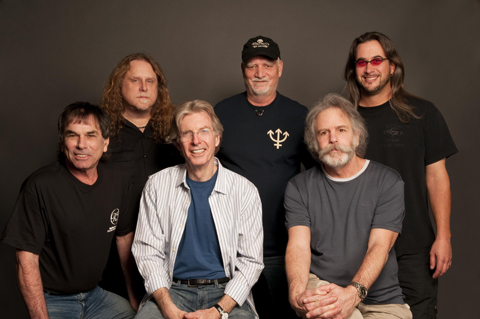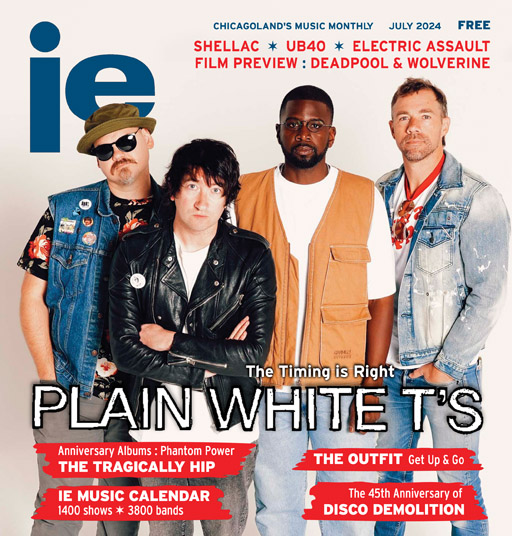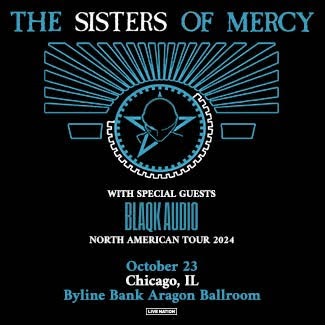Cover Story: The Dead
The Afterlife Afterparty

Bill Kreutzmann is in Washington D.C. and, from where he’s sitting, a bad place. He’s not getting weird vibes or whatever lame, hippie mysticism people derisively ascribe to his band and their followers – he can’t get an Internet signal. “I’m trying to get my computers up,” he says, pausing to plead with someone in the background. “They don’t have very good wi-fi here where I’m staying, so I have to use ethernet.” When his interviewer informs him their own computer crashed the same morning, he lets loose an “Ooooo” most people recoil with when learning a friend needs a colonoscopy. “If mine crashed I’d be in hot water.”
Appearing: May 4th and 5th at Allstate Arena (6920 N. Mannheim) in Rosemont.
When smartasses harp on Kreutzmann’s band, The Dead (a rekindled Grateful Dead following founder Jerry Garcia’s ’95 death), they mention patchouli oil, hemp accessories, and, oh yeah, potent hallucinogens. Most will neglect to mention their spellbinding musicianship, much less that they were giving their music away and being quite successful, even before this whole “Internet” fad reared its ugly pus.
People bought their albums, surely, but The Grateful Dead’s longevity was staked on a tradition of shared concert recordings, the experiences most people in the industry are taught to treat as commodities. “Control your image,” high-end managers tell their bands. “You’ll never make money otherwise.”
Yet Kreutzmann, during the rare occasion he isn’t on tour, can afford to unwind on tracts of his own land in Hawaii. “I’m just wondering – I was asked the other day about ‘Gee, how do you feel about all these people being able to record you?’ I didn’t get to answer him, so we’ll give you the question,” he laughs. “It’s actually great. I think it really helped the band’s career to put out free music. No other bands to this day do that. Phish don’t do it, do they? [They do – Ed.] And you said the magic words [referring to an earlier question IE did ask]: Now it’s biting ’em in the butt. It helps us to have the recordings out there.
“The bottom line,” he says, craftily using boardroom speak, “is there’s so many artists out there and the Internet’s making it all available. You [need to be] your own record company, basically.”
How did they do it? This band, who so many dismiss with a mock puff of weed and the two-finger “peace” symbol, figured out a world that was only just taking off when they played their last show. It all goes back to their derided ’60s principles of togetherness: “We lived communally, shared things, and that was our statement then.”
But to be honest, that last quote was offered as part of a response in a repudiation of those ideals: The Dead’s decision to openly support Barack Obama’s presidential campaign. Self-styled historians tend to lump the San Franciscan Haight-Ashbury lifestyle in with the anti-Vietnam movement. The Grateful Dead were Haight-Ashbury. And you won’t find any Humphrey or McGovern pins in Kreutzmann’s sock drawer.
“My participation? We didn’t do it in the ’60s at all,” he says unapologetically. “We were apolitical. We knew that Nixon was not our best president and those kinds of things. The way we did it was we lived our life the way we lived our life. We weren’t told what to do at Haight-Ashbury, we did what we wanted.”
So why the ’08 reversal? “It had gotten so bad with the Bush Administration the last eight years, we couldn’t stand by and not help get Obama elected,” Kreutzmann insists. “There’s a point where you can only say ‘get out and vote’ [so much]; hardly anybody voted during the Bush period. We could help, and I think we did. We played at Penn State to about 15,000 students, and Pennsylvania was a swing state.”
For the most part, Kreutzmann’s personal politics are more environmental in nature. “I’m a diver and my environmental causes are to protect the oceans. One of ’em is the dolphin killing they do in Japan for six months of the year.” He gets a little prickly when ribbed about whether it has anything to do with why The Grateful Dead never played The Land Of The Rising Sun. “It’s not the Japanese, let’s make that really clear. I love to play in America, but I love to spread the happiness and I think the Japanese would like us. Let me tell you this: It’s a select group of fishermen that practice what I described. It’s the government, the higher-ups like our last administration. They’re fooled and they’re eating dolphin meat that’s loaded with mercury – 35-percent more than the acceptable amount. The point is no amount of mercury should be there. It’s not the Japanese people, it’s a select high-government officials and some fishermen. There’s only like 37 of them, but every year they kill 1,000 dolphins. And it’s not the dolphins I’m really arguing about – it’s the feeding poison to their own people. It causes blindness, deafness, poor thinking.” Clearly.
Just think, if he hadn’t spent the last 40 years on the road, Kreutzmann could have been one hell of an activist. “When I was a young lad, I loved animals. I used to watch ‘Flipper’ a lot,” he teases. “But what did I do as a young lad? I just liked to build things. I used to build model airplanes and stuff. But once I found music, that was it.”
And that’s almost all there is. Ask Kreutzmann what he likes to do when he isn’t playing music, and his gut response is “Play music.” Even at home during a tour break when he should be relaxing, his garage calls to him. “I live in Hawaii, lucky me, on the island of Kaua’i and I play ’til the police come. They say, ‘Bill, the music sounds great. Could you please turn it down? You’ve gotta stop.’ We have a really great garage band – the players are good over there. We have a really great bass player from Alaska, Milo Matthew, and Dan The Man on guitar, and a couple others that are really super. This time of year, of course, it’s warmer in Hawaii than it is in Alaska or Colorado or wherever, and people will come there for awhile. They always bring their instruments and we end up in my garage and start playing. I have one of my best drum sets there, a bass amplifier, a guitar amplifier, and a monitor system for the vocals.”
It’s enough to make you plead, “Enough, Bill. Enough!” But his island shenanigans don’t begin to tell the story. Oddly, Kreutzmann’s origins don’t involve much music. Born to an attorney father and Stanford University dance-instructor mother, his only tuneful bloodlines ran through an uncle who failed to teach him the piano. “I just wasn’t ready yet,” Kreutzmann says. Still, “Music was a way for me as a kid to escape the so-called normal, regular world – which is to say it made me feel good. I could listen to music and lie on the couch and rock back and forth. I loved it, and the natural progression was to learn to do it.”
— Steve Forstneger
For the full interview, grab the May issue of Illinois Entertainer, available free throughout Chicagoland.










